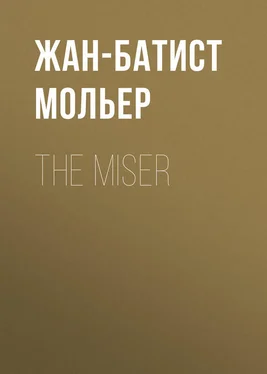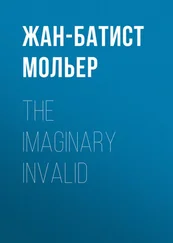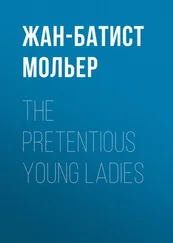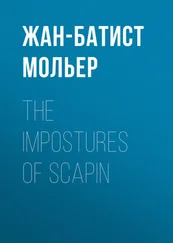Жан-Батист Мольер - The Miser
Здесь есть возможность читать онлайн «Жан-Батист Мольер - The Miser» — ознакомительный отрывок электронной книги совершенно бесплатно, а после прочтения отрывка купить полную версию. В некоторых случаях можно слушать аудио, скачать через торрент в формате fb2 и присутствует краткое содержание. Жанр: foreign_antique, foreign_prose, foreign_dramaturgy, на английском языке. Описание произведения, (предисловие) а так же отзывы посетителей доступны на портале библиотеки ЛибКат.
- Название:The Miser
- Автор:
- Жанр:
- Год:неизвестен
- ISBN:нет данных
- Рейтинг книги:4 / 5. Голосов: 1
-
Избранное:Добавить в избранное
- Отзывы:
-
Ваша оценка:
- 80
- 1
- 2
- 3
- 4
- 5
The Miser: краткое содержание, описание и аннотация
Предлагаем к чтению аннотацию, описание, краткое содержание или предисловие (зависит от того, что написал сам автор книги «The Miser»). Если вы не нашли необходимую информацию о книге — напишите в комментариях, мы постараемся отыскать её.
The Miser — читать онлайн ознакомительный отрывок
Ниже представлен текст книги, разбитый по страницам. Система сохранения места последней прочитанной страницы, позволяет с удобством читать онлайн бесплатно книгу «The Miser», без необходимости каждый раз заново искать на чём Вы остановились. Поставьте закладку, и сможете в любой момент перейти на страницу, на которой закончили чтение.
Интервал:
Закладка:
Molière
The Miser
ACT I
SCENE I. – VALÈRE, ÉLISE
Val. What, dear Élise! you grow sad after having given me such dear tokens of your love; and I see you sigh in the midst of my joy! Can you regret having made me happy? and do you repent of the engagement which my love has forced from you?
Eli. No, Valère, I do not regret what I do for you; I feel carried on by too delightful a power, and I do not even wish that things should be otherwise than they are. Yet, to tell you the truth, I am very anxious about the consequences; and I greatly fear that I love you more than I should.
Val. What can you possibly fear from the affection you have shown me?
Eli. Everything; the anger of my father, the reproaches of my family, the censure of the world, and, above all, Valère, a change in your heart! I fear that cruel coldness with which your sex so often repays the too warm proofs of an innocent love.
Val. Alas! do not wrong me thus; do not judge of me by others. Think me capable of everything, Élise, except of falling short of what I owe to you. I love you too much for that; and my love will be as lasting as my life!
Eli. Ah! Valère, all men say the same thing; all men are alike in their words; their actions only show the difference that exists between them.
Val. Then why not wait for actions, if by them alone you can judge of the truthfulness of my heart? Do not suffer your anxious fears to mislead you, and to wrong me. Do not let an unjust suspicion destroy the happiness which is to me dearer than life; but give me time to show you by a thousand proofs the sincerity of my affection.
Eli. Alas! how easily do we allow ourselves to be persuaded by those we love. I believe you, Valère; I feel sure that your heart is utterly incapable of deceiving me, that your love is sincere, and that you will ever remain faithful to me. I will no longer doubt that happiness is near. If I grieve, it will only be over the difficulties of our position, and the possible censures of the world.
Val. But why even this fear?
Eli. Oh, Valère! if everybody knew you as I do, I should not have much to fear. I find in you enough to justify all I do for you; my heart knows all your merit, and feels, moreover, bound to you by deep gratitude. How can I forget that horrible moment when we met for the first time? Your generous courage in risking your own life to save mine from the fury of the waves; your tender care afterwards; your constant attentions and your ardent love, which neither time nor difficulties can lessen! For me you neglect your parents and your country; you give up your own position in life to be a servant of my father! How can I resist the influence that all this has over me? Is it not enough to justify in my eyes my engagement to you? Yet, who knows if it will be enough to justify it in the eyes of others? and how can I feel sure that my motives will be understood?
Val. You try in vain to find merit in what I have done; it is by my love alone that I trust to deserve you. As for the scruples you feel, your father himself justifies you but too much before the world; and his avarice and the distant way in which he lives with his children might authorise stranger things still. Forgive me, my dear Élise, for speaking thus of your father before you; but you know that, unfortunately, on this subject no good can be said of him. However, if I can find my parents, as I fully hope I shall, they will soon be favourable to us. I am expecting news of them with great impatience; but if none comes I will go in search of them myself.
Eli. Oh no! Valère, do not leave me, I entreat you. Try rather to ingratiate yourself in my father's favour.
Val. You know how much I wish it, and you can see how I set about it. You know the skilful manoeuvres I have had to use in order to introduce myself into his service; under what a mask of sympathy and conformity of tastes I disguise my own feelings to please him; and what a part I play to acquire his affection. I succeed wonderfully well, and I feel that to obtain favour with men, there are no better means than to pretend to be of their way of thinking, to fall in with their maxims, to praise their defects, and to applaud all their doings. One need not fear to overdo it, for however gross the flattery, the most cunning are easily duped; there is nothing so impertinent or ridiculous which they will not believe, provided it be well seasoned with praise. Honesty suffers, I acknowledge; but when we have need of men, we may be allowed without blame to adapt ourselves to their mode of thought; and if we have no other hope of success but through such stratagem, it is not after all the fault of those who flatter, but the fault of those who wish to be flattered.
Eli. Why do you not try also to gain my brother's goodwill, in case the servant should betray our secret?
Val. I am afraid I cannot humour them both. The temper of the father is so different from that of the son that it would be difficult to be the confidant of both at the same time. Rather try your brother yourself; make use of the love that exists between you to enlist him in our cause. I leave you, for I see him coming. Speak to him, sound him, and see how far we can trust him.
Eli. I greatly fear I shall never have the courage to speak to him of my secret.
SCENE II. – CLÉANTE, ÉLISE,
Cle. I am very glad to find you alone, sister. I longed to speak to you and to tell you a secret.
Eli. I am quite ready to hear you, brother. What is it you have to tell me?
Cle. Many things, sister, summed up in one word – love.
Eli. You love?
Cle. Yes, I love. But, before I say more, let me tell you that I know I depend on my father, and that the name of son subjects me to his will; that it would be wrong to engage ourselves without the consent of the authors of our being; that heaven has made them the masters of our affections, and that it is our duty not to dispose of ourselves but in accordance to their wish; that their judgment is not biassed by their being in love themselves; that they are, therefore, much more likely not to be deceived by appearances, and to judge better what is good for us; that we ought to trust their experience rather than the passion which blinds us; and that the rashness of youth often carries us to the very brink of dangerous abysses. I know all this, my sister, and I tell it you to spare you the trouble of saying it to me, for my love will not let me listen to anything, and I pray you to spare me your remonstrances.
Eli. Have you engaged yourself, brother, to her you love?
Cle. No, but I have determined to do so; and I beseech you once more not to bring forward any reason to dissuade me from it.
Читать дальшеИнтервал:
Закладка:
Похожие книги на «The Miser»
Представляем Вашему вниманию похожие книги на «The Miser» списком для выбора. Мы отобрали схожую по названию и смыслу литературу в надежде предоставить читателям больше вариантов отыскать новые, интересные, ещё непрочитанные произведения.
Обсуждение, отзывы о книге «The Miser» и просто собственные мнения читателей. Оставьте ваши комментарии, напишите, что Вы думаете о произведении, его смысле или главных героях. Укажите что конкретно понравилось, а что нет, и почему Вы так считаете.












